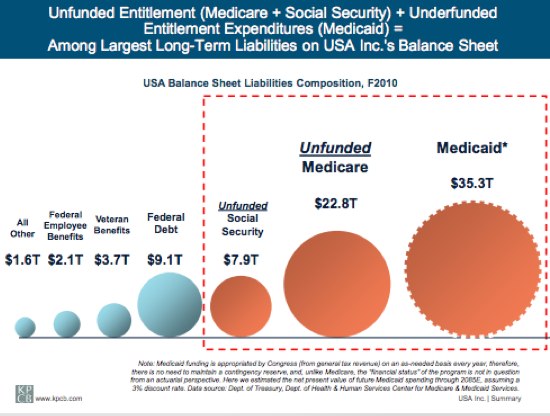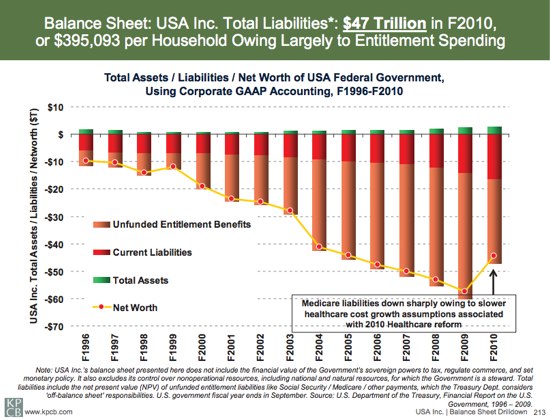The Magnitude of the Mess We're In
The next Treasury secretary will confront problems so daunting that even Alexander Hamilton would have trouble preserving the full faith and credit of the United States.
By George P. Shultz, Michael J. Boskin, John F. Cogan, Allan H. Meltzer and John B. Taylor
Sometimes a few facts tell important stories. The American economy now is full of facts that tell stories that you really don't want, but need, to hear.
Where are we now?
Did you know that annual spending by the federal government now exceeds the 2007 level by about $1 trillion? With a slow economy, revenues are little changed. The result is an unprecedented string of federal budget deficits, $1.4 trillion in 2009, $1.3 trillion in 2010, $1.3 trillion in 2011, and another $1.2 trillion on the way this year. The four-year increase in borrowing amounts to $55,000 per U.S. household.
The amount of debt is one thing. The burden of interest payments is another. The Treasury now has a preponderance of its debt issued in very short-term durations, to take advantage of low short-term interest rates. It must frequently refinance this debt which, when added to the current deficit, means Treasury must raise $4 trillion this year alone. So the debt burden will explode when interest rates go up.
The government has to get the money to finance its spending by taxing or borrowing. While it might be tempting to conclude that we can just tax upper-income people, did you know that the U.S. income tax system is already very progressive? The top 1% pay 37% of all income taxes and 50% pay none.
Did you know that, during the last fiscal year, around three-quarters of the deficit was financed by the Federal Reserve? Foreign governments accounted for most of the rest, as American citizens' and institutions' purchases and sales netted to about zero. The Fed now owns one in six dollars of the national debt, the largest percentage of GDP in history, larger than even at the end of World War II.
The Fed has effectively replaced the entire interbank money market and large segments of other markets with itself. It determines the interest rate by declaring what it will pay on reserve balances at the Fed without regard for the supply and demand of money. By replacing large decentralized markets with centralized control by a few government officials, the Fed is distorting incentives and interfering with price discovery with unintended economic consequences.
Did you know that the Federal Reserve is now giving money to banks, effectively circumventing the appropriations process? To pay for quantitative easing—the purchase of government debt, mortgage-backed securities, etc.—the Fed credits banks with electronic deposits that are reserve balances at the Federal Reserve. These reserve balances have exploded to $1.5 trillion from $8 billion in September 2008.
The Fed now pays 0.25% interest on reserves it holds. So the Fed is paying the banks almost $4 billion a year. If interest rates rise to 2%, and the Federal Reserve raises the rate it pays on reserves correspondingly, the payment rises to $30 billion a year. Would Congress appropriate that kind of money to give—not lend—to banks?
The Fed's policy of keeping interest rates so low for so long means that the real rate (after accounting for inflation) is negative, thereby cutting significantly the real income of those who have saved for retirement over their lifetime.
The Consumer Financial Protection Bureau is also being financed by the Federal Reserve rather than by appropriations, severing the checks and balances needed for good government. And the Fed's Operation Twist, buying long-term and selling short-term debt, is substituting for the Treasury's traditional debt management.
This large expansion of reserves creates two-sided risks. If it is not unwound, the reserves could pour into the economy, causing inflation. In that event, the Fed will have effectively turned the government debt and mortgage-backed securities it purchased into money that will have an explosive impact. If reserves are unwound too quickly, banks may find it hard to adjust and pull back on loans. Unwinding would be hard to manage now, but will become ever harder the more the balance sheet rises.
The issue is not merely how much we spend, but how wisely, how effectively. Did you know that the federal government had 46 separate job-training programs? Yet a 47th for green jobs was added, and the success rate was so poor that the Department of Labor inspector general said it should be shut down. We need to get much better results from current programs, serving a more carefully targeted set of people with more effective programs that increase their opportunities.
Did you know that funding for federal regulatory agencies and their employment levels are at all-time highs? In 2010, the number of Federal Register pages devoted to proposed new rules broke its previous all-time record for the second consecutive year. It's up by 25% compared to 2008. These regulations alone will impose large costs and create heightened uncertainty for business and especially small business.
This is all bad enough, but where we are headed is even worse.
President Obama's budget will raise the federal debt-to-GDP ratio to 80.4% in two years, about double its level at the end of 2008, and a larger percentage point increase than Greece from the end of 2008 to the beginning of this year.
Under the president's budget, for example, the debt expands rapidly to $18.8 trillion from $10.8 trillion in 10 years. The interest costs alone will reach $743 billion a year, more than we are currently spending on Social Security, Medicare or national defense, even under the benign assumption of no inflationary increase or adverse bond-market reaction. For every one percentage point increase in interest rates above this projection, interest costs rise by more than $100 billion, more than current spending on veterans' health and the National Institutes of Health combined.
Worse, the unfunded long-run liabilities of Social Security, Medicare and Medicaid add tens of trillions of dollars to the debt, mostly due to rising real benefits per beneficiary. Before long, all the government will be able to do is finance the debt and pay pension and medical benefits. This spending will crowd out all other necessary government functions.
What does this spending and debt mean in the long run if it is not controlled? One result will be ever-higher income and payroll taxes on all taxpayers that will reach over 80% at the top and 70% for many middle-income working couples.
Did you know that the federal government used the bankruptcy of two auto companies to transfer money that belonged to debt holders such as pension funds and paid it to friendly labor unions? This greatly increased uncertainty about creditor rights under bankruptcy law.
The Fed is adding to the uncertainty of current policy. Quantitative easing as a policy tool is very hard to manage. Traders speculate whether and when the Fed will intervene next. The Fed can intervene without limit in any credit market—not only mortgage-backed securities but also securities backed by automobile loans or student loans. This raises questions about why an independent agency of government should have this power.
When businesses and households confront large-scale uncertainty, they tend to wait for more clarity to emerge before making major commitments to spend, invest and hire. Right now, they confront a mountain of regulatory uncertainty and a fiscal cliff that, if unattended, means a sharp increase in taxes and a sharp decline in spending bound to have adverse effect on the economy. Are you surprised that so much cash is waiting on the sidelines?
What's at stake?
We cannot count on problems elsewhere in the world to make Treasury securities a safe haven forever. We risk eventually losing the privilege and great benefit of lower interest rates from the dollar's role as the global reserve currency. In short, we risk passing an economic, fiscal and financial point of no return.
Suppose you were offered the job of Treasury secretary a few months from now. Would you accept? You would confront problems that are so daunting even Alexander Hamilton would have trouble preserving the full faith and credit of the United States. Our first Treasury secretary famously argued that one of a nation's greatest assets is its ability to issue debt, especially in a crisis. We needed to honor our Revolutionary War debt, he said, because the debt "foreign and domestic, was the price of liberty."
History has reconfirmed Hamilton's wisdom. As historian John Steele Gordon has written, our nation's ability to issue debt helped preserve the Union in the 1860s and defeat totalitarian governments in the 1940s. Today, government officials are issuing debt to finance pet projects and payoffs to interest groups, not some vital, let alone existential, national purpose.
The problems are close to being unmanageable now. If we stay on the current path, they will wind up being completely unmanageable, culminating in an unwelcome explosion and crisis.
The fixes are blindingly obvious. Economic theory, empirical studies and historical experience teach that the solutions are the lowest possible tax rates on the broadest base, sufficient to fund the necessary functions of government on balance over the business cycle; sound monetary policy; trade liberalization; spending control and entitlement reform; and regulatory, litigation and education reform. The need is clear. Why wait for disaster? The future is now.
The authors are senior fellows at Stanford University's Hoover Institution. They have served in various federal government policy positions in the Treasury Department, the Office of Management and Budget and the Council of Economic Advisers.
Wall Street Journal






